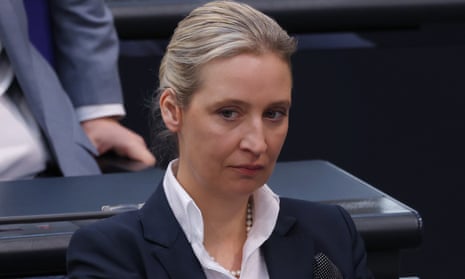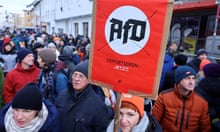The leader of Germany’s far-right Alternative für Deutschland has said her party will campaign for a Brexit-style vote on EU membership if it comes to power, calling the UK’s departure from the bloc a model for its largest member.
Alice Weidel told the Financial Times in an exclusive interview that the UK decision would be “dead right” for Germany, and that a “Dexit” would boost the country’s self-determination.
“It’s a model for Germany, that one can make a sovereign decision like that,” she said.
It was one of the party’s first public pronouncements since the beginning of a wave of nationwide protests against the AfD, triggered by revelations that leading members had attended a covert meeting at which a “masterplan” for mass deportations of foreigners and German passport holders was discussed, with a view to the party implementing the plans if it came to power.
Weidel called the exposé “scandalous” and said it had misrepresented her party, which only wanted to use the law to repatriate people who had no right to remain in Germany. “The AfD is the party that stands for enforcing this country’s laws,” she said.
Street protests in Germany against the AfD in reaction to the revelations only grew in momentum over the weekend, with more than a million people estimated to have participated in 90 different demonstrations across the country.
Police were forced to order at least two events, in Hamburg and Munich, to come to a premature halt due to the large numbers, with turnouts far greater than predicted either by authorities or organisers.
In Berlin, where more than 100,000 people braved icy winds to gather at the square in front of the Reichstag parliament building, a march due to move through the government quarter was called off because of the sheer numbers of people.
Weidel, a former investment banker who has led the party since 2022, said that before moving to a Dexit referendum an AfD-led government would aim to reform the European Union and do away with its “democratic deficit”, by, among other things, reducing the powers of the European Commission, an “unelected executive”.
“If a reform isn’t possible, if we fail to rebuild the sovereignty of the EU member states, we should let the people decide, just as Britain did,” she said. “And we could have a referendum on Dexit, a German exit from the EU.”
The AfD is currently enjoying its highest standing in the polls since its formation in 2013. It is between 20% and 23% on a federal level, ahead of all three of the parties which make up the chancellor, Olaf Scholz’s beleaguered coalition.
In three eastern states where elections are due to take place in the autumn, it is scoring into the 30s, with around 36% in Thuringia, and overshadowing the mainstream parties.
But it is being kept out of power by other parties ruling out any form of coalition with the party. Because of that the AfD is not in power in any of the country’s 16 states.
German public support for membership of the EU is very high, with recent polls showing it at around 80%. It is weakest among AfD voters, however.
But the ambition and the fact Weidel is willing to express it points to the fact the AfD’s goals are very long-term, with political scientists often referring to the party’s extreme patience about gaining power.
A debate is currently under way in Germany as to whether the party could be banned on the grounds it is unconstitutional, on the back of the domestic intelligence agency having classified large parts of the party as rightwing extremist and put some of its higher-ranking members under surveillance.
However, legal and political opposition to pursuing such a ban, including from Scholz, and his deputy, the economics minister, Robert Habeck, is high, due to the dangers of it backfiring and galvanising more support for the party, should it fail.
after newsletter promotion
Pressure is on Scholz and his government to get more of a grip on the challenges currently facing Germany, over Ukraine, the cost of living crisis, a skills shortage, and climate reform, all of which has been compounded by a budget crisis. Disgruntlement over government management has in part helped the surge in support for the AfD, as the party has fed off the growing unease.
But the AfD has struggled to contain the backlash over the revelations.
Weidel was forced to sack her senior aide Roland Hartwig over his attendance at the meeting, which she says she knew nothing about. She did not attend herself and denies that the party plans to implement the measures discussed. She has reportedly faced disagreement internally for the decision to sack Hartwig.
At a closed-door meeting of the party leadership at the weekend, the Correctiv exposé was discussed, “briefly and intensely”, according to Carsten Hütter, the party treasurer and leadership member. Members decided to “stay our course” as well as trying to “be better and clearer in our communication”, Hütter told the Süddeutsche Zeitung.
Another major fallout from the exposé is the decision by Hans-Georg Maaßen at the weekend, to turn his WerteUnion – a self-described arch-conservative grassroots movement within the Christian Democratic Union (CDU) and its sister party, the CSU, two of whose members were at the meeting – to form a new political party.
Maaßen said that the party would be up and running in time for the crucial eastern state election, and that unlike the CDU, it was prepared to work with the AfD.
Friedrich Merz, the head of the CDU, said CDU/CSU members, who make up the vast majority of the WerteUnion’s members, would have to renounce their party membership if they joined the new party.
It marks the further fragmentation of the German political landscape coming in the same month that Sahra Wagenknecht broke from the far-left Die Linke to form her own new leftwing anti-immigrant party.








